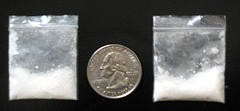High Blood-Pressure Medication (Diltiazem) May Also Block Cocaine Cravings
Comments (1)University researchers have announced a potential breakthrough in the understanding of cocaine addiction - and a common high blood pressure medication may change the way cocaine addicts get better.
A common high blood pressure medication, diltiazem, may offer cocaine addicts a way to dampen the intense cravings so associated with the addiction – it seems to work on rats anyway.
Researchers from Boston University School of Medicine and Harvard Medical School used animal model studies to examine the role calcium channels in the brain play in the presence and intensity of cocaine cravings.
Diltiazem works to control blood pressure by blocking calcium channels in the brain. The two neurotransmitters most influenced by cocaine use are dopamine and glutamate, and these two transmitters are linked through calcium channels. Heavy cocaine use increases these calcium channel connections, and increases the learned cravings of an addiction. Blocking these connections eases the cravings.
Calcium in the brain influences the memory process, and cocaine usage modifies calcium channeling in an area of the brain associated with motivation. By increasing calcium linking in this motivation area, cocaine users teach themselves to be motivated to use cocaine, even when it seems to do them great harms - A distortion of normal learning and negative consequence aversion.
Researcher Chris Pierce, of Boston University Medical School, asserted that since there were currently no effective pharmacological treatments for cocaine addiction, understanding the neuro chemical processes driving behaviors could lead to a breakthrough in the treatment of the disease.
The complete findings of the study can be read in the March issue of the journal, Nature Neuroscience.


